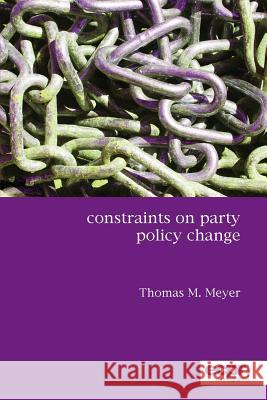Constraints on Party Policy Change » książka
Constraints on Party Policy Change
ISBN-13: 9781907301490 / Angielski / Miękka / 2013 / 285 str.
Political scientists are quite good at predicting 'optimal' policy positions that - under the given circumstances - allow parties to get maximal payoffs in terms of policy, office or votes. What we do not know is whether parties are actually able to take these positions or whether they are constrained to do so. This book attempts to narrow this gap. The major argument is that parties do not choose policy positions from scratch and that they cannot freely change their policy platforms. Rather, voters' lacking perception of changing party platforms and intra-party factors constrain parties when shifting their policy positions. An empirical analysis of party policy shifts in ten Western European democracies shows that these constraints differ across parties and thus affect the parties' position-taking differently. Considering this variation is important to derive more precise predictions for parties' policy platforms and for our understanding of party behaviour in general.
Political scientists are quite good at predicting optimal policypositions that - under the given circumstances - allow parties toget maximal payoffs in terms of policy, offi ce or votes. What we donot know is whether parties are actually able to take these positionsor whether they are constrained to do so. This book attempts tonarrow this gap. The major argument is that parties do not choosepolicy positions from scratch and that they cannot freely changetheir policy platforms. Rather, voters lacking perception ofchanging party platforms and intra-party factors constrain partieswhen shifting their policy positions. An empirical analysis of partypolicy shifts in ten Western European democracies shows thatthese constraints differ across parties and thus affect the partiesposition-taking differently. Considering this variation is importantto derive more precise predictions for parties policy platforms andfor our understanding of party behaviour in general."This very good and very important book analyses why (andwhen) political parties shift their policy positions. Meyer presentsinnovative empirical analyses and theoretical arguments showingthat party policy change is constrained by factors includingparties organisational structures, their governing status, theirresources, their previous policy behaviour, the prestige of thepartys leader, and voters levels of political interest. By shiftinghis focus away from parties static policy positions and ontoparties policy shifts, Meyer advances our understanding ofparties election strategies and the dynamics of mass-elite policylinkages. This powerful book will help to shape the study ofparties and elections for years to come."Professor James Adams, Department of Political ScienceUniversity of California"This book adds usefully to our knowledge of party behaviour indemocracies, to the development of democrative theory and tothe assessment of the comparative evidence relating to it. In theseways, it adds signifi cantly to the ECPR book series as a whole andto comparative political science in general."Ian Budge, Professor Emeritus of GovernmentUniversity of Essex











